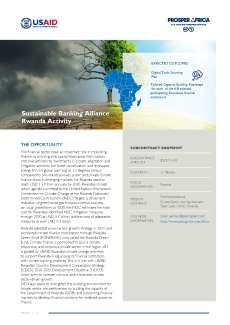THE OPPORTUNITY
The financial sector plays an important role in mobilizing finance by ensuring that capital flows away from carbon-intensive activities to investments in climate adaptation and mitigation activities, like forest conservation and renewable energy.To limit global warming to 1.5 degrees Celsius compared to pre-industrial levels, public and private climate finance flows in emerging markets like Rwanda need to reach USD 1.5 trillion annually by 2030. Rwanda’s climate action agenda submitted to the United Nations Framework Convention on Climate Change as the Rwanda Nationally Determined Contributions (NDC) targets a 38 percent reduction of greenhouse gas emissions below businessas- usual projections by 2030; the NDC estimates the total cost for Rwanda’s identified NDC mitigation measures through 2030 at USD 5.7 billion, and the cost of adaptation measures at over USD 5.3 billion.
Rwanda adopted a low-carbon growth strategy in 2011 and pioneered climate finance mobilization through Rwanda Green Fund (FONERWA), now called the Rwanda Green Fund. Climate finance is positioned to spur a climate responsive and conscious private sector in the region. ATI is guided by USAID Rwanda’s climate change priorities to support Rwanda in equipping its financial institutions with climate banking practices. This is in line with USAID Rwanda’s Country Development Cooperation Strategy (CDCS) 2020-2025 Development Objective 3 (DO3), which aims to increase inclusive and sustainable private sector-driven growth.
DO3 also seeks to strengthen the enabling environment for private sector competitiveness by building the capacity of the Government of Rwanda (GOR) and supporting financial markets to develop financial solutions for widened access to finance./
SUBCONTRACT SNAPSHOT
SUBCONTRACT AMOUNT $529,716.20
DURATION 11 Months
FOCUS GEOGRAPHIES Rwanda
MISSION CONTACT Fina Kayisanabona, Private Sector and Agribusiness, Team Lead, USAID Rwanda.
FOR MORE INFORMATION Email: partners@atiprogram.com
https://www.usaid.gov/prosperafrica
Expected Outcomes
Digital Tools Sourcing Plan
Tailored Capacity Building Roadmaps for each of the 6-8 selected participating Rwandese financial institutions
THE PARTNERSHIP
Rwanda’s banking sector has already taken steps to increase climate finance flow in alignment with the country’s environmental goals.The Kigali International Financial Centre’s (KIFC) Sustainable Finance Roadmap sets out an ambitious strategy for Rwanda to “be a leading pan-African hub for local, regional, and international sustainable finance based on its strategic location, efficient and cost-effective financial system, and first-class human capital.” Through the NDC Partnership, the National Bank of Rwanda (NBR) has asked for assistance in assessing financial risks and developing guidelines for reporting financial risks related to climate change. Moreover, there are several international finance and donor groups, such as the European Investment Bank and the World Bank, that are working with Rwandan institutions to help develop the climate finance landscape.
Despite this support, Rwandan financial institutions, particularly commercial banks, require additional capacity building and technical guidance to understand the physical risks of climate change and its financial impacts. KIFC’s Sustainable Finance Roadmap found that at the close of 2020, very few Rwandan companies would qualify for investment under any stringent Environment Social Governance (ESG) investment criteria. In response to this, the Sustainable Banking Alliance Rwanda (SBAR) project funded by USAID Rwanda through the USAID Africa Trade, and Investment (ATI) Activity has been set up, and aims to build the capacity of Rwandese financial institutions to drive sustainable finance using climate responsive financial tools. These efforts are geared towards embedding sustainability within their financial models, and to prompt the Rwanda private sector to rise to Environment Social Governance (ESG) investment criteria. To accomplish these objectives, a series of activities working directly with banks will be implemented consisting of two phases: 1) climate finance needs assessments and 2) capacity-building workshops.
Phase one will encompass doing a climate finance needs assessment will seek to achieve the following key objectives:
1. For a target subset of 6 - 8 banks and financial institutions in Rwanda, identify gaps in understanding sustainable finance and how to embed it into their operations.
2. Develop a roadmap tailored to each financial institution to incorporate sustainable finance into their portfolios. Phase two which will be executed through capacity building workshops will achieve the following objectives:
Phase two which will be executed through capacity building workshops will achieve the following objectives:
1. Conduct capacity building workshops for six to eight Rwandese financial institutions based on the Capacity Needs Assessment/roadmap outlined in Phase 1 above.
2. Source or design needed digital tools (such as a carbon accounting tool) that banks need, based on the Capacity Needs Assessment/Roadmap outlined in Phase 1 above.
3. Support Rwandese banks and financial institutions in integrating the new skills and tools acquired into their financial operations.

